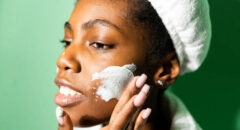
It’s standard knowledge that eczema can cause red, scratchy patches on the skin. But if you’re one of the more than 31 million Americans who live with eczema, you may find it useful to have more in-depth knowledge about the condition. Being well-informed can empower you to take an energetic role in addressing your health. In turn, you may find it easier to control painful flare-ups.
So, how well do you know your eczema? Take the following self-assessment to find out.
1. Eczema is an umbrella term for several different skin conditions
- True
- False
A: True
The name eczema refers to related skin conditions, including atopic dermatitis, contact dermatitis, dyshidrotic eczema, nummular eczema, seborrheic dermatitis, and stasis dermatitis. While all these kinds of eczema cause redness and itchiness, some also cause blistering and peeling. Talk to your physician about which type of eczema you have and whether there are any explicit triggers you can avoid.
RELATED: The Perfect Skincare Routine for Dry, Scaly Skin
2. With the proper medication, eczema can be cured in most patients
- True
- False
A: False
There’s presently no cure for eczema, but it’s possible to manage your symptoms and minimize flare-ups. Many treatment options are available, both over-the-counter and with a prescription, to help you manage the condition. These treatments include moisturizers, topical ointments, systemic medications, and biologic drugs. Talk to your physician about which eczema treatment path might be right.
3. If someone in your family has eczema, you are more likely to develop the condition.
- True
- False
A: True
Although the precise causes of eczema still aren’t known, genetics plays a role. Kids of one parent with eczema, asthma, or hay fever have a 25 percent chance of developing the condition, while kids whose parents both have eczema, asthma, or hay fever have a 50 percent chance.
4. Eczema is more contagious during flare-ups
- True
- False
A: False
Eczema is NOT transferable, and it is impossible to “catch” eczema from someone with the condition.
5. Eczema can be caused by stress
- True
- False
A: False
Although heightened stress levels can sometimes contribute to flare-ups, stress itself can’t cause a person to develop eczema. If stress-related outbreaks are a problem for you, try using stress management strategies like deep breathing and mindfulness to help you calm down when you’re feeling tense.
6. If you have eczema, you should avoid swimming
- True
- False
A: False
Indeed, the chemicals in some pools and the salt in some natural bodies of water may irritate eczema. However, rinsing off immediately with fresh water and applying moisturizer and sunscreen after swimming can help control flare-ups.
7. Adjusting your diet can help control your eczema symptoms
- True
- False
A: True
Although no diet can heal eczema, avoiding trigger foods may help manage your symptoms. Foods high in sugar and trans fats may trigger flare-ups. Food may also be a trigger if you have a food allergy. Typical food allergens include dairy, eggs, and nuts, among others. For more details on how to plan eczema-friendly meals, consult your physician.
RELATED: Could a Non-Dairy Diet Cure Your Skin Problems?
8. Taking a hot shower or bath can relieve your eczema symptoms
- True
- False
A: False
Bathing with water that’s too hot can worsen symptoms of eczema. Use lukewarm water instead, and avoid scrubbing with rougher tools like washcloths or loofas. When you’re done bathing, pat yourself dry with a soft towel and apply any moisturizers or topical ointments you presently use to treat your skin.
9. The effects of eczema can extend beyond skin problems
- True
- False
A: True
Many individuals with eczema also experience other health conditions, such as insomnia and depression. Eczema can also increase the risk of developing asthma, hay fever, allergies, and several skin-related infections. Contact your physician if eczema begins to cause any symptoms that extend beyond your skin.








